As summer heat intensifies, your air conditioning unit becomes essential in maintaining a comfortable indoor environment. However, the increased demand can lead to overheating and potential breakdowns.
To make sure your AC unit does its job all season and doesn’t break down in the thick of summer, it’s important to adopt preventative measures. Here are ten effective ways to keep your air conditioning unit from overheating this summer.
1. Regular Maintenance
Regular maintenance, like any major home appliance is vital for keeping your air conditioning unit in tip-top shape. Schedule a professional inspection at least once a year to check for any potential issues. A technician will clean the components, replace filters, and ensure the system runs efficiently.
2. Clean or Replace Filters
Air filters trap dust, dirt, and other particles, preventing them from entering the system. Over time, these filters can become clogged, similar to your dryer vent, reducing airflow and causing the unit to work harder, leading to overheating.
Check your filters monthly. Then, you can decide if they just need to be cleared or replaced, which is typically every 1-3 months. There are a variety of different filter shapes and sizes, so make sure you measure and confirm the size you need.
3. Keep the Condenser Unit Clean
The outdoor unit, which should be no surprise, is exposed to the elements year-round and can accumulate dirt, leaves, and debris. This buildup is dirty on the outside and also restricts airflow, and can cause the unit to overheat.
Make sure to regularly clear the area around the condenser and clean the coils to maintain proper airflow and cooling efficiency.
4. Ensure Proper Airflow
Blocked vents and registers can affect the overall efficiency of your air conditioning system, causing it to overheat. Ensure that furniture, curtains, and other objects are not obstructing airflow.
It is also important to check for any leaks or gaps in your ductwork that might cause the system to work harder than necessary.
5. Use a Programmable Thermostat
A smart thermostat allows you to be in control of the temperatures in specific rooms and during specific times of the day based on your schedule, reducing the strain on your air conditioning unit. By programming your thermostat to a warmer temperature when you’re not home and cooler once you return, you can prevent the unit from running continuously and overheating.
6. Seal and Insulate Your Home
Proper insulation and ensuring windows and door cracks are properly sealed can significantly reduce the amount of work your air conditioning system needs to do to perform, not to mention, it can significantly lower your electric bills.
Adding new insulation to your attic or walls can also help stabilize the indoor temperature, reducing the need for excessive cooling.
7. Use Fans to Supplement Cooling
Ceiling fans and portable fans help to circulate air throughout your home, reducing the need for constant air conditioning and offering a nice breeze. By using fans in addition to your air conditioner, you can raise the thermostat setting slightly without sacrificing comfort, which reduces the unit’s workload and prevents overheating.
8. Keep Heat-Producing Appliances Away
Appliances like ovens, stoves, and even lamps can produce heat that affects your indoor temperature. It is a great idea to try and use any heat-producing appliances to a minimum during the hottest parts of the day and keep them away from the thermostat to avoid false readings that could cause the air conditioner to overwork.
9. Shade the Condenser Unit
The outdoor condenser unit can overheat if it’s exposed to direct sunlight for extended periods. Provide shade for the unit by planting trees or installing a shade structure, but ensure there’s still adequate airflow around it. This minor change can help maintain the efficiency and longevity of your air conditioning system.
10. Monitor Refrigerant Levels
Low refrigerant levels are a very common reason that causes air conditioners to overheat and fail. If you notice a decrease in cooling efficiency or if the unit is constantly running, it might be due to low refrigerant. A professional technician can check the refrigerant levels and recharge the system if necessary, ensuring optimal performance.
Bonus Tip: Upgrade to an Energy-Efficient Model
If your air conditioning unit is old and frequently overheating despite regular maintenance, it might be time to consider an upgrade. Newer, energy-efficient models are designed to handle higher cooling demands more effectively, reducing the risk of overheating and lowering your energy bills.
Conclusion
Preventing your air conditioning unit from overheating during the summer is essential for maintaining a comfortable home and avoiding costly repairs. Regular maintenance, proper airflow, insulation, and strategic use of supplementary cooling methods can all contribute to the efficient operation of your system.
By following these ten tips, you can keep your AC unit running smoothly and enjoy a cool, stress-free summer.
You might also be interested in: 10 Easy Ways To Reduce Your Home Energy Bills




